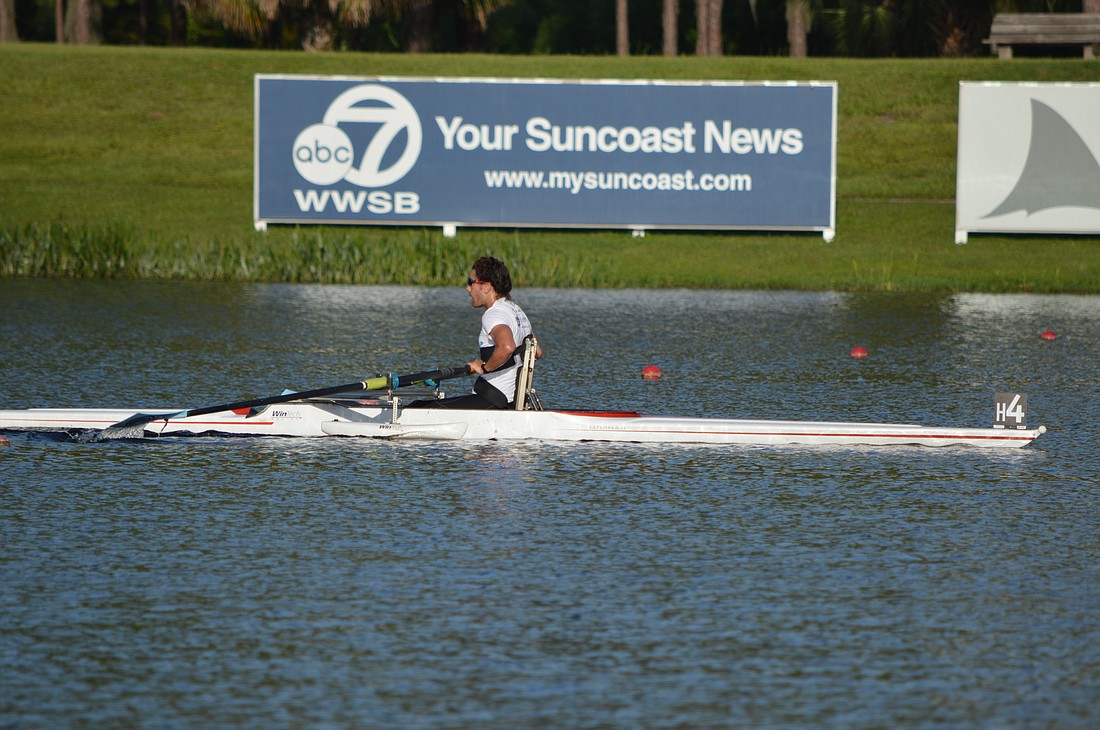- November 22, 2024
-
-
Loading

Loading

There's something about rowing that appeals to incredible competitors.
It seems like whenever I cover a rowing event, I find a story of perseverance or skill or something even greater. It can be true of global events like the 2017 World Rowing Championships, of course, but it is also true at an event like the USRowing Masters National Championship, which were held Aug. 11-14 at Nathan Benderson Park. The event brought in more than 775 rowers from 96 clubs across the country.
Despite the national championship moniker, the event is more of a friendly celebration of rowing than a deadly serious competition. The Masters designation, after all, means the event is open to anyone over the age of 21. There were also no necessary qualifying times. People were racing because they love the sport and its community.
Still, there were great stories to be told. Take Elliot Vasquez as an example. Vasquez, 29, was involved in a January 2013 car accident that left him a paraplegic, losing his motor skills and sensation below the T5/T6 region of his spine — essentially from the middle of his chest down. The injury changed his day-to-day life, but Vasquez has not let it affect his abilities as a competitor. He's continued to push his body as far as it will go.
That alone is worthy of celebration, but it turns out Vasquez is a darned, good athlete, too.
Vasquez, who lives in Sarasota, started his athletic career in hand cycling, but he became interested in rowing in 2018 after seeing photos of para-athletes competing in the sport, particularly Jacqui Kapinowski, a two-time U.S. Paralympian who also founded a nonprofit organization to help para-athletes called Shifting Gears. Last year, he decided to take the plunge and try it himself. Vasquez said he actually had the honor of practicing with Kapinowski at Nathan Benderson Park. That experience, getting to talk to her about the sport, convinced Vasquez to give rowing his best effort.
Vasquez uses an adaptive seat in his boat that allows him to have a back rest and straps him in, making sure he does not fall into the water. It also keeps him balanced, allowing him to focus purely on generating power from his arms, shoulders and upper chest. That's good, because rowing is no easy feat, even for an athlete like Vasquez, who said his first day of rowing practice left him sore. Practice two was easier, and by the third practice, Vasquez said he could envision himself competing in the sport long-term.
His work paid off on the final day of the Masters National Championships. In his first-ever competitive race, Vasquez took a gold medal in the PR1 Men's Masters 1x Final (8:11.99).
Vasquez trains at Nathan Benderson Park and competes for New Crew SRQ, an organization founded in 2021 that offers an adaptive/para-rowing program. Though he admits his personal experience is limited, Vasquez said he considers Nathan Benderson Park to be the mecca of rowing and encourages everyone to give it a shot, no matter what their athletic ability or physical limitations.
"There's two aspects to this sport," Vasquez said. "One is the exercise aspect, which is great. The other is the community aspect. When you have a support system behind you, it changes everything. Through my recovery, support was everything. If you're around people who remain competitive and want you to be competitive as well, that attitude will trickle on down to you. So if you're in the area, come on out. There are people here for you. There's equipment here. Everything is accessible. My goal is to connect with as many people as possible and bring them in."
Vasquez wasn't the only story. Consider Urs Wunderli.
He pronounces his name like "oars," which is appropriate, since he loves rowing more than most people love anything. Wunderli turned 80 years old Aug. 11. On Aug. 12, he raced in the "parent-child" race alongside not his son, but his grandson, Luke Rucolas of Connecticut's Maritime Rowing. They finished third (3:50.61). On Aug. 13, Wunderli took a silver medal in the Men's Open J-K 1x Final (5:20.21) and he did so using an old school, wooden Stämpfli boat made in 1967, something he bought in 2003 and won't ever give up.
In other words, it was a special weekend.
Wunderli, of Sarasota, said he taught Rucolas, 16, to row at Nathan Benderson Park when he was 9 years old. He watched Rucolas grow. When he got into the boat with him Aug. 11, Wunderli said he finally stopped seeing him as that child learning to row.
"When we crossed the finish line — well, first I had to catch my breath, I couldn't think about anything," Wunderli said. "But then I said to myself, I didn't just race with my grandson, I raced with an athlete. A real one. He's devoted to this. He's keyed in. It's so cool to see."
As for the wooden boat he used in his singles race, well, Wunderli just likes it, even when competing against boats made of carbon fiber-reinforced plastic.
"She and I have gotten older together," Wunderli said with a toothy smile. "That company, Stämpfli, is the tree of life in boats and in racing shells. They are at the root of everything. They are first-rate. When I came across it for purchase, I simply said 'Thank you very much.' It has held up and is a great vessel."
For someone so in love with the sport, and who has passed that love on to others, it is amazing that Wunderli only began rowing in 1996. His and Vasquez's stories go to show that — even though it sounds a bit cliche — it is never too late to start your rowing career, no matter who you are. If you still haven't given the sport a chance, consider this a sign to change that.
Who knows what your rowing story will become.